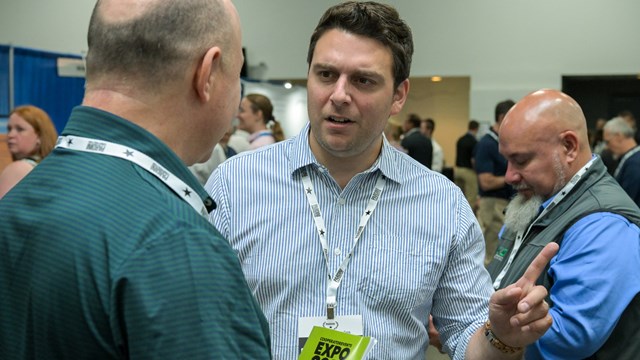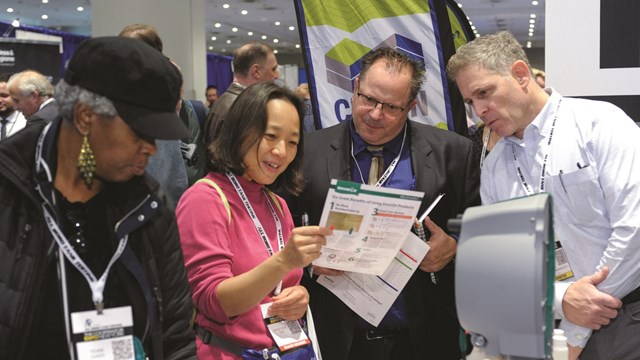Not every condominium or homeowners’ association is going to run afoul of the law—the happy truth is that litigation and legal trouble are relatively rare occurrences. However, even the most upstanding board in New Jersey must navigate a labyrinth of association law in the course of serving its ownership, and the odds are that its trusty group of volunteers will include few, if any, qualified legal professionals.
So what to do in order to ensure that your association’s business remains on the up-and-up? Hiring one of the aforementioned legal eagles would be a good start, sure, but how best to ascertain which attorney or firm is the one to guide your association right and true? Turns out, choosing a legal pro isn't so different from choosing any other kind of service provider your HOA might need—even if the stakes are somewhat higher.
Trust Your Associates
Sometimes, the best advice on which professional to hire comes from those with whom you already have strong professional relationships. In the case of a condo or co-op board, a good place to start is your property manager.
“Most referrals come by way of a management company who has dealt with an attorney and/or law firm on other buildings, and are quite happy with services rendered,” says Denise DeNicola, an associate with the Philadelphia office at the law firm of Montgomery McCracken Walker & Rhoads LLP. “And an individual needs special ‘people skills’ to represent a co-op or condo board. An attorney who can’t make the time to show compassion and patience and have the ability to hand-hold when necessary will not succeed as a condo/co-op attorney.”
Fortunately, the burden of meeting with qualified attorneys does not fall entirely upon the condo or co-op. An attorney who possesses the people skills cited by DeNicola is also one adept at networking, and may well cross paths with community decision-makers at local events, trade shows, and other venues. “Most law firms with a devoted practice in community association law spend a great percentage of time making and nurturing new relationships,” notes Jennifer Loheac, a shareholder attorney with the law firm of Becker & Poliakoff in Morristown.
Direct and straightforward as referrals can be however, it's worth keeping in mind that in some cases, one professional may have ulterior motives for recommending another. “The positive aspect of relying on a management recommendation is that the managing company has most likely worked with the attorney before and thinks highly of that professional,” says Loheac.
It's also just as important for boards to research, vet out, and otherwise do their homework before hiring any kind of pro, legal or otherwise. That means asking for—and following up on—references, and, says Joseph Scharnak, a partner with Arnstein & Lehr, a law firm with offices on the East Coast and in Chicago, reading publications like this one, or “Anything with relevant, local industry news. See what attorneys are publishing articles therein. Then visit those attorneys’ websites, review their backgrounds, where they’ve done speaking engagements, where else they’ve been published, and generally how active they are in the industry. Then call and ask them to come in for an interview. It’s fairly common for attorneys to go meet with boards for said process. I do it dozens of times a year.”
The Specialists
Here’s a thing that’s really going to rock your worlds, readers: like nearly everyone else, most attorneys try to turn a profit for their services. And—like any kind of vendor or service provider—some prioritize this more than others, potentially overselling their services. Given the unique and specific nature of condo and co-op governance, it’s imperative that a board make sure that any pro they hire is not just conversant in that field of law, but actively commits to condo and co-op law as a specialty.
Especially in New York, where co-ops are such a relevant entity—much more so than in other markets—understanding the nuances between co-ops and condos is crucial for any legal pro, even if the two are similar in many regards. “An attorney must understand how both condos and co-ops work in order to do the best possible job for the building,” says DeNicola. “Although there really isn’t much of a difference as to how we deal with either entity, I do find that co-ops tend to have more ‘issues’ as they have more rules and regulations—hence more restrictions—on shareholders than condos do on their unit owners.”
And Loheac notes that the relationship between a building or association and its lawyer isn't as cut-and-dry as other legal partnerships can be: “A good association lawyer realizes that they are counseling clients where they live, and that this often requires the understanding of a cross-section of laws, from property to contract to insurance to employment to environmental to constitutional; and lawyers also have to be adept at balancing legal answers with practical solutions to everyday living. No community association benefits from their attorney sitting behind her desk offering high-minded legal solutions in a vacuum.”
“Similarly, our work is not only reactive,” she continues. “A community needs more from its attorney than for them to hunt down delinquencies and enforce rule violations. Owners are proud of their homes; it’s an investment for them. An attorney should accordingly care about their clients’ communities, its problems, its history and culture. They should be sensitive to those communities hit hardest by a storm, or those with an advanced aging population and special needs, or those that may be struggling financially and facing increasing vacancies. A good attorney can help secure a loan, modernize aging governing documents and create an emergency preparedness plan.”
Scharnak agrees. “Representing a condo or co-op is pretty specialized and intricate. There are a lot of different factors, and different types of law that come into play. Someone called me just the other day and said that they’d hired someone and paid them $4,000, only for that attorney to turn around and say, ‘This is above my pay grade. I don’t know how to do this type of law.’ Well then why did either party engage the other in the first place?”
He also stresses the distinction between transactional attorneys and litigators. “Most attorneys that claim to do both do not do them both well. You’re going to need to have transactional attorneys to crank out documents—be they amendments to the declaration, rules and regulations, reviewing & negotiating contracts—all the day-to-day stuff that every association has. There are going to be slip-and-fall cases; there are going to be employment law cases; there are going to be discrimination cases. All of these things happen with some frequency, and you’re going to need a strong litigator to step up. As a transaction attorney myself, I have not the skill set nor the background nor the desire to attempt that. So, were someone to come to me looking for a litigator, I would point them to a colleague.”
Time to Get Paid
Of course, no matter the type of service at issue, every piper needs be paid at some point, and different law firms and attorneys have protocols as to how that should happen. Despite this variance, there are some basic things every board should know, and certain things for which they should watch out.
“For the most part, we have hour billing files for our buildings,” explains DeNicola, “and then, when called upon to deal specifically with a shareholder or a unit owner, we open separate hourly files, as these charges are generally billed back to either the shareholder or unit owner. While we clearly charge hourly for our time, some more active buildings prefer a monthly flat fee. These would have to be adjusted if that building and/or board was involved in litigation and more legal time was being expended on that file; but a proprietary lease and bylaws generally allow boards to charge back legal fees to the ‘offending’ unit owner or shareholder.”
DeNicola also notes that she has rarely seen a long-term contract between a building and a law firm. “As with any client-attorney relationship, the building can terminate at any time.”
And Loheac notes that, while some communities will keep a lawyer on an hourly billing rate and call as needed, she would not recommend this approach for mid- or large-size communities. “There are many issues that arise, and it’s important for an attorney to be present and available to boards frequently, including at association meetings. It’s difficult for attorneys to advise clients when they may not even be aware of the issue, or when a client didn't realize that it had a problem. The most successful boards enter into a relationship with their attorneys and rely on them for advice both legal and practical.”
The upshot of hiring legal counsel for your association—whether you're switching firms, or hiring an attorney for the very first time—is that the process should be approached with the same level of seriousness and scrutiny with which you'd approach any high-ticket item or service for your community. Do your homework, check references, ask questions (even tough ones), and if someone makes claims that seem too good to be true, they probably are. Your legal pro(s) are your community's guardians—and guard dogs, if need be—and you owe it to your board and residents to pick the best people for the job.
Mike Odenthal is a reporter and staff writer for The New Jersey Cooperator.










3 Comments
Leave a Comment